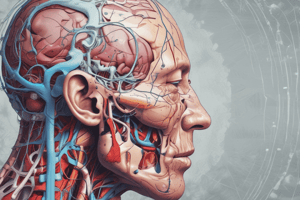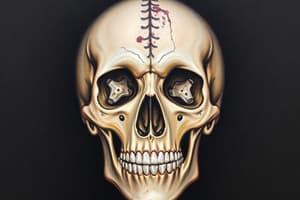Podcast
Questions and Answers
Which guideline is followed for resuscitation in head injuries?
Which guideline is followed for resuscitation in head injuries?
- GCS
- ACCC
- ACLS
- ATLS (correct)
Which symptom is not a part of Cushing's Triad?
Which symptom is not a part of Cushing's Triad?
- Irregular Respiration
- Bradycardia
- Hypertension
- Reflux Tachycardia (correct)
Which of the following is NOT a component of Triple H therapy in managing Sub Arachnoid Hemorrhage Vasospasms?
Which of the following is NOT a component of Triple H therapy in managing Sub Arachnoid Hemorrhage Vasospasms?
- Hypervolemia
- Induce Hypertension
- Maintain Normothermia (correct)
- Hemodilution
What is the GCS score of a patient who is confused, talks irrelevant speech, opens eyes to painful stimulus, and localizes pain?
What is the GCS score of a patient who is confused, talks irrelevant speech, opens eyes to painful stimulus, and localizes pain?
Which statement about a patient with severe head injury and CT findings of a biconcave hypodense lesion is true?
Which statement about a patient with severe head injury and CT findings of a biconcave hypodense lesion is true?
Flashcards are hidden until you start studying
Study Notes
Resuscitation and Guidelines
- Resuscitation in head injuries follows Advanced Trauma Life Support (ATLS) guidelines.
- ATLS provides protocols for managing trauma patients, emphasizing rapid assessment and treatment.
Cushing's Triad
- Cushing's triad includes hypertension, bradycardia, and irregular respiration.
- It is a clinical syndrome indicating elevated intracranial pressure (ICP).
Triple H Therapy
- Triple H therapy is used for the management of vasospasms in Subarachnoid Hemorrhage.
- Components of Triple H therapy:
- Induction of hypertension
- Hypervolemia
- Hemodilution
- Maintaining normothermia is not part of this therapy.
Glasgow Coma Scale (GCS)
- In a traumatic head injury scenario, a young gentleman displays confusion, responds to painful stimuli, and localizes pain.
- Based on observed behaviors, his GCS score is calculated as 11.
Hangman Fracture
- The Hangman fracture refers to a fracture of the C2 vertebra.
- This type of fracture is associated with a high risk of spinal cord injury.
Common Brain Tumors
- The most common brain tumor in adults is metastasis.
- Metastatic tumors originate from cancer in other parts of the body and spread to the brain.
Three Column Concept
- The Three Column concept of spine fractures was designed by Denis.
- This framework helps classify spinal injuries and guide treatment decisions.
Unconscious Head Injury Patients
- In unconscious head injury cases, CT scans may reveal biconcave hypodense lesions.
- Management often involves surgical intervention, with craniotomy indicated for hematoma sizes greater than 15mm.
Initial Management of Raised ICP
- Initial management of raised intracranial pressure includes various interventions that should be avoided:
- Trendelenburg's positioning is not recommended in this context.
- Loosening collars, controlling seizures, and maintaining normocapnia ventilation are appropriate measures.
Autonomic Dysreflexia
- Autonomic dysreflexia may manifest in patients with spinal injuries and involves symptoms like bradycardia and flushing from specific triggers.
- Hypotension is not typically categorized under autonomic dysreflexia.
Exam Preparation Tips
- Focus on understanding key concepts rather than memorizing answers.
- Familiarize with the terminology and definitions related to head injuries, spinal injuries, and management protocols.
- Understand the implications of each condition and treatment to answer application-based questions effectively.
Studying That Suits You
Use AI to generate personalized quizzes and flashcards to suit your learning preferences.




